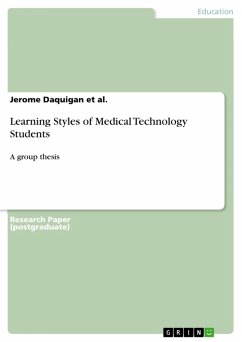Research Paper (postgraduate) from the year 2011 in the subject Didactics for the subject English - Grammar, Style, Working Technique, , language: English, abstract: Background of the Study It is observed in the past years that some students tend to be intelligent in different ways. Intelligence has been defined and studied under a number of different rubrics, among them individual differences, cognitive abilities, and aptitudes. Probably the most influential developments in our recent understanding of these concepts have come from educational and psychological researchers associated with cognitive psychology. Three of those individuals, Robert Sternberg, Howard Gardner, and John Horn serve as a representative sample of researchers who have made significant gains in our current conceptions of intelligence. Robert Sternberg. Sternberg's (1985) theory of intelligence contains three sub theories, one about context, one about experience, and one about the cognitive components of information processing. The contextual sub theory attempts to specify what would be considered "intelligent" in a given culture or context. According to him, culturally intelligent behavior involves adapting to one's present environment, selecting a more optimal environment, or reshaping one's current environment. The experiential sub theory claims that the expression of any intelligent behavior will be a function of the amount of experience one has with the particular class of tasks being tested. According to Sternberg, intelligence is best demonstrated when the task is relatively novel or unfamiliar. The componential sub theory describes the cognitive structures and processes that together produce intelligent behavior. Sternberg proposes three general types of processes: met components, performance components, and knowledge acquisition components. As a whole, the diarchic theory claims different aspects or kinds of intelligence. Howard Gardner, one of the most popular recent views of intelligence, at least among practitioners, has come from Gardner. He proposes a theory of multiple intelligences in which he claims there are seven relatively independent intelligences and in 1999 added an eighth intelligence. Those intelligences are logical-mathematical, linguistic, musical, visual-spatial, bodily-kinesthetic, interpersonal, intrapersonal, and naturalistic intelligence. Additionally, Gardner recognizes that one's experiences will influence the degree to which each of the intelligences can be expressed. [...]
Dieser Download kann aus rechtlichen Gründen nur mit Rechnungsadresse in A, B, BG, CY, CZ, D, DK, EW, E, FIN, F, GR, HR, H, IRL, I, LT, L, LR, M, NL, PL, P, R, S, SLO, SK ausgeliefert werden.


